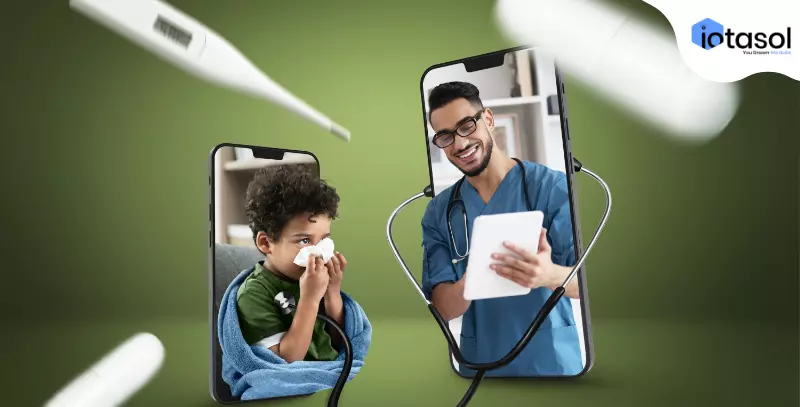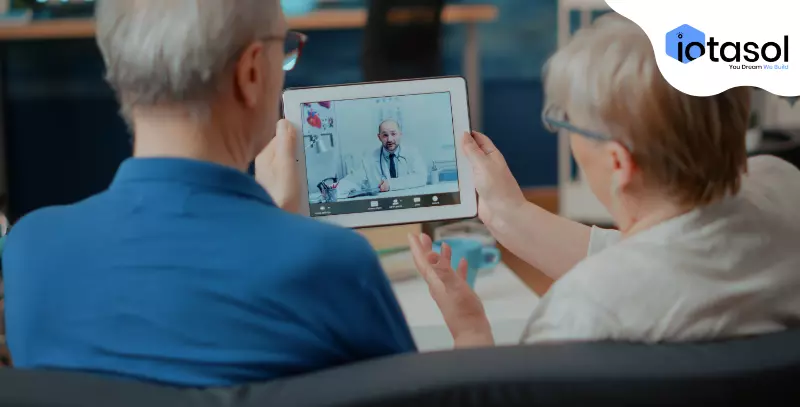Industry: Healthcare
6 Min Read
Introduction
The metaverse is the talk of the town in the technology world today. Its contribution and potential to revolutionize
various domains like Gamification, commerce, work, and the entertainment industry is being discussed everywhere.
Also, it can have a great impact on the healthcare industry but this has not been discussed extensively so far.
Let me explain a few common terms before we dive deep into the whole concept of the metaverse in healthcare.
1. What is metaverse?
There is a lot of confusion in people’s minds as to what exactly metaverse is.
It is the next version of the internet which will make use of artificial intelligence, virtual reality,
and augmented reality
and created environments that are artificial but produce far more immersive online experiences than what we have now.
With the bringing together of three main technological fields in the metaverse, it can do wonders for the healthcare industry.
They can create such channels in the collaboration that will affect the care process by lowering costs and improving patient results.
2. Let's discuss what can metaverse do for the healthcare domain.
a. Telehealth
Refers to access to medical services in a remote setup. It is also called telemedicine.
This trend became quite famous during the pandemic covid 19. While the entire world was
living in a bubble, going out to seek medical help could lead to more danger of the virus being spread at
a fast rate. In this scenario, doctors all over were providing virtual consultations on calls and video consultations.
But while general illnesses can be easily understood and prescribed medicines for,
specific cases where doctors need to intervene and examine more than just listening
to patient concerns, metaverse can play an important role.
Research says that before 2020, remote healthcare facilities were provided by only
43% of service providers. However, owing to the need of the hour, this number has gone up to 95% in the present times.
Willing to switch to a telehealth platform to manage your practice
Virtual reality, due to offering great immersion (only one of the many benefits of the metaverse) can revolutionize telehealth
consultations which are confined to video calling and voice calling currently.
The headset-based VR experiences give the feel of actually being present there much more
effectively than other virtual setups like a website, social media messaging apps, etc.
b. The Accessibility
Telehealth features can ensure that patients can get treatment from experts sitting
anywhere rather than being confined to the medical professional available in their location.
Let's say you are in some part of east Asia and your best medical professional is sitting in
America, you can be available in the same room just by wearing headsets.
Moreover, scans and other tests can be done locally and the data can be transferred to
the remote practitioner for reference. This is a highly beneficial provision for areas
where medical help is not easily accessible. Patients who live in rural areas and have
to travel large distances for medical help can also avail of this.
c. Digital twinning
A digital twin can be defined as a simulation or an artificial counterpart of any object, process, or system which helps to learn more about the original
subject. In the medical sector, this digital twin can be the patient himself.
Scientists believe that digital twins can be used as test dummies and they can be checked on how a patient will
recover from an operation procedure, and what impact or reactions different medicines will have on him.
Surprisingly as it comes, doctors believe that they can even age the digital twin and check the
impact of the current medical procedures on the patient 10 years from now.
It will be almost like being able to peep into the future and is an insane thing. .
d. Blockchain technology
As soon as we say blockchain, most people think of ‘ bitcoin’. However, in simple terms, blockchain refers to encrypted and distributed databases that make the storage and transfer of data safe so that no one but only the owner can use that data.
This technology can play an important role in healthcare, by managing and keeping safe our precious medical records and data. Meanwhile, the medical data is shared between different medical institutions in an inefficient and opaque manner without any control of the owner on it.
Usually, medical data is stored on centralized servers and is at risk of being stolen for the reason that its resale value is high.
Moreover, accessing data is a long and tedious process even for those people who legit need this data for example- our medical professionals or us for that matter.
The time and effort that is spent in accessing one's health records are insanely frustrating. It will make a lot more sense if everyone has access to their health records and a personal file on the blockchain.
3. The biggest benefits are :
a. Unhackable
It will be unhackable ensuring great safety for your medical data while being available with a few simple clicks.
Every time you need to share your medical records with any practitioner around the world, it will be a breeze.
b. Converging Technologies
The convergence of different technologies like VR, augmented reality, artificial intelligence, etc.
will help medical professionals provide more wholesome experiences to patients.
The sharing of swift information among clinicians would lead to quickly find out the reasons for illnesses.
Using metaverse to track patient activity can help control factors such as compliance which can have its own repercussions.
Another benefit is the ability to use multifaceted approach to understand the causes of illnesses. Let’s say a patient is being treated of knee injury in the absence of the fruitfulness of the physiotherapy, other factors
like depression or some sort of mental illness can be tested for using VR to have a clear view by the medical practitioner.
c. Medical Training
The traditional methods of training offer only limited resources for the practice of learners.
One reason is the huge amount spent on doing procedures on cadavers which affects the fees of the students also.
However, virtual reality’s incorporation in training can provide simulated environments for students to practice.
This way, immersive surgical training can be availed at affordable prices.
Manage your patients and clinic processes better with our custom-made digital platform
Using virtual cadavers rather than using a real cadaver can allow students to work individually for training
rather than working in groups. These kinds of training sessions positively impact the technical capabilities of the trainee. He learns attributes like precision, decision-making, etc.
Also, it is common to use robot-assisted operations by doctors for performing difficult
procedures with accuracy, virtual reality is comparatively a new tool for practicing surgical procedures.
Since offline classes were stopped during the pandemic, such a teaching model became the need of the hour for
medical colleges. This could save students as well as teachers from distress.
Metaverse can solve so many problems for the medical education industry.
Conclusion
While there are a few concerns regarding privacy or the security features around the concept of the metaverse, medical practitioners are all set to benefit from these advancements and improve patient care.
The fact that web 3.0 which is the foundation of the metaverse, depends on blockchain technology and will formulate decentralized applications.
As per stats, the VR healthcare industry was valued at $1206.6 million in 2021 and is likely to touch $11,657 million by 2028, making it significant that the healthcare industry will be revolutionized with VR-based metaverse.
It will be really interesting to witness such advancements in the healthcare industry.







